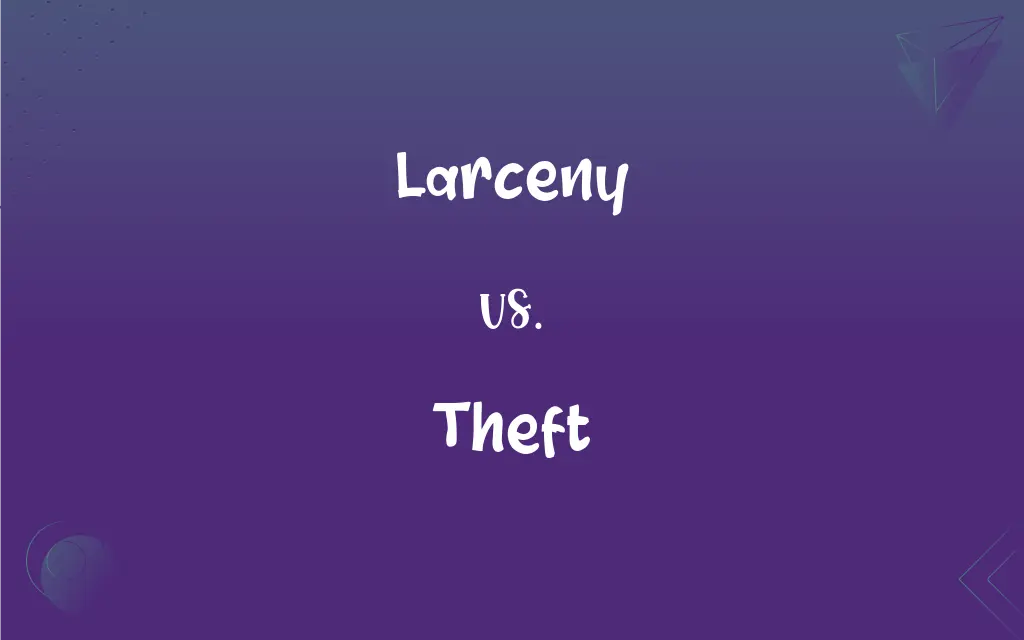Larceny vs. Theft: What's the Difference?
Edited by Aimie Carlson || By Harlon Moss || Updated on October 17, 2023
Larceny is taking someone's property without force or deceit with intent to permanently deprive; theft is a broader term for any act of stealing.

Key Differences
Larceny is a specific category of theft, defined as the unlawful taking and carrying away of someone else's personal property with the intent to permanently deprive the rightful owner of it. Conversely, theft is an umbrella term that encompasses a variety of crimes involving taking someone else's property, including larceny.
Larceny typically requires the physical movement of the property to classify it as such, meaning the property must be carried away, even slightly, from its original position. Theft, on the other hand, applies to a range of property crimes, including those not involving physical movement, like identity theft or intellectual property theft.
While larceny is specifically concerned with the physical taking of property without the use of force or deception, theft can also include other forms of stealing such as burglary, robbery, or embezzlement, where force or deception may be used.
Larceny is often classified into grades like grand or petty larceny, based on the value of the property stolen. In contrast, theft doesn’t necessarily consider the value of the stolen item but the act itself, and it includes various forms based on how the property was taken.
In legal terms, larceny requires an intent to permanently deprive the owner of the property, which must be proven in court. Theft, while also requiring intent, has broader applications and can include temporary deprivation or unlawful appropriation of services.
ADVERTISEMENT
Comparison Chart
Definition
Taking someone's property without force/deceit
General term for any act of stealing
Involves Movement
Typically requires carrying away property
Can involve non-physical forms of stealing
Types
Classified as grand or petty based on value
Encompasses various forms, e.g., embezzlement, robbery
Use of Force
Does not involve force
May or may not involve force
Legal Requirement
Intent to permanently deprive must be proven
Intent to deprive, permanently or temporarily
ADVERTISEMENT
Larceny and Theft Definitions
Larceny
Larceny does not involve the use of force or fraud.
Though he entered the building legally, taking the computer was larceny.
Theft
Theft is the general act of stealing property or services.
He was arrested for the theft of a car.
Larceny
Larceny is categorized as grand or petty based on the stolen property’s value.
Due to the high value of the jewelry, he was charged with grand larceny.
Theft
Theft can be of physical items, identity, or intellectual property.
Illegally downloading movies is a form of theft.
Larceny
Larceny involves unlawfully taking and carrying away someone’s property.
He committed larceny by stealing the paintings.
Theft
Theft can occur with or without physical movement of the property.
Copying confidential files also constitutes theft.
Larceny
Larceny requires intent to permanently deprive the owner of the property.
The intent behind the larceny was clear when he sold the stolen goods.
Theft
Theft requires the intent to deprive the owner of their property or services.
The theft was premeditated, as shown by messages on his phone.
Larceny
Larceny entails physically moving the property from its position.
She committed larceny by taking the bike from the rack and riding away.
Theft
Theft includes a variety of stealing forms, like robbery or embezzlement.
The CEO faced charges of theft for embezzling company funds.
Larceny
The unlawful taking and removing of another's personal property with the intent of permanently depriving the owner; theft.
Theft
The unlawful taking of the property of another; larceny
The prevention of theft.
Larceny
The unlawful taking of personal property as an attempt to deprive the legal owner of it permanently.
Theft
An instance of such taking
Several car thefts.
Larceny
A larcenous act attributable to an individual.
That young man already has four assaults, a DUI, and a larceny on his record.
Theft
(Obsolete) Something stolen.
Larceny
The unlawful taking and carrying away of things personal with intent to deprive the right owner of the same; theft. Cf. Embezzlement.
Theft
The act of stealing property.
Bike theft is on the rise
A suspect was arrested for the theft of a gold necklace.
Larceny
The act of taking something from someone unlawfully;
The thieving is awful at Kennedy International
FAQs
Is there a minimal value for larceny?
It depends on jurisdiction, often a small amount.
How does larceny differ from theft?
Larceny is a specific type of theft without force.
Can larceny be a misdemeanor?
Yes, if it's petty larceny, based on value.
Can larceny charges be dropped?
Yes, with insufficient evidence or legal errors.
Can larceny be expunged?
It depends on jurisdiction and case specifics.
What is theft?
Taking someone's property or services without consent.
Can theft include non-physical property?
Yes, like identity or intellectual property theft.
What is larceny?
The unlawful taking and carrying away of property.
Is stealing a car larceny or theft?
It's both, specifically called grand larceny/theft.
What's the most common type of theft?
Petty theft, often of low-value items.
Is embezzlement larceny?
No, embezzlement involves betrayal of trust.
What's the difference between larceny and robbery?
Robbery involves force or intimidation; larceny doesn't.
What are the consequences of theft?
Fines, imprisonment, restitution, and a criminal record.
Is theft always a felony?
No, it can be a misdemeanor based on value/severity.
Do you always go to jail for theft?
Not always; it depends on severity and jurisdiction.
Is shoplifting larceny?
Yes, typically petty larceny.
How is theft proven in court?
Through evidence of unlawful taking and intent.
Is borrowing without permission theft?
If intent to return is clear, it's not theft.
Can theft be accidental?
No, theft requires intent.
Are there defenses against theft charges?
Yes, like claiming ownership or lack of intent.
About Author
Written by
Harlon MossHarlon is a seasoned quality moderator and accomplished content writer for Difference Wiki. An alumnus of the prestigious University of California, he earned his degree in Computer Science. Leveraging his academic background, Harlon brings a meticulous and informed perspective to his work, ensuring content accuracy and excellence.
Edited by
Aimie CarlsonAimie Carlson, holding a master's degree in English literature, is a fervent English language enthusiast. She lends her writing talents to Difference Wiki, a prominent website that specializes in comparisons, offering readers insightful analyses that both captivate and inform.
































































